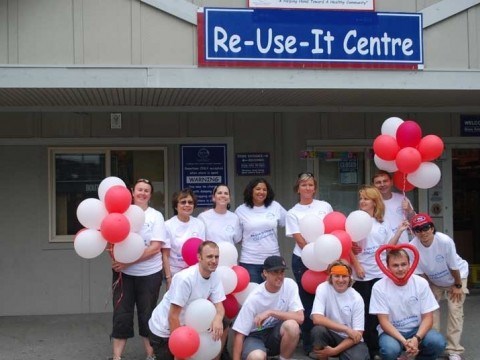Tucked away among the car mechanics and industrial businesses of Function Junction, the Re-Use-It Centre has become a mainstay within the Whistler community.
Each day, residents reduce the amount of stuff they throw in the trash by donating their old goods. Each fall, seasonal workers trek there to fully furnish their rental suites for $300. And each year, the Whistler Community Services Society uses the profits to fund 27 social programs throughout the resort municipality.
But it was only 10 years ago this week that the second hand shop in the south end of Whistler first opened its doors. On Saturday, June 27, members of the community services society celebrated the centre's 10 th anniversary with hotdogs, raffles, live music and even further discounted prices.
The municipality and Janet McDonald, the past executive director of the society, joined forces to build the Re-Use-It Centre on the Function Junction waste collection site in 1999, recounted the society's current executive director Greg McDonnell.
Even in the early days, they always envisioned that profits from the Re-Use-It Centre would funnel back into the society's other social programs, like Youth Outreach, the food bank, and emergency financial assistance.
"It wouldn't have come through without the municipality's involvement," said McDonnell.
"The council of the day had a lot of foresight to allow for the planning. They built it, it is on their land and it worked out really well on the waste collection site out there.
"It is a really wonderful example of social entrepreneurship, and it came in at a time when non-profits seeking grants from the government and foundations was the norm."
The location of the centre next to the waste collection site worked well, said McDonnell. People dropping off their garbage and recycling could also drop off their old shirts, shoes, and kitchenware at the same time.
These days, profits from the Re-Use-It Centre have grown to allow the society to fund 70 per cent of their programs themselves, although they still rely on grants and donations to cover the rest of their funding.
But McDonnell said running the centre is not easy.
"It is quite a complex beast, the Re-Use-It Centre. There are a lot of challenges to pull it off," he said.
It costs the society about $200,000 to run the centre each year. On top of that, the society usually pays $5,000 a year in tipping fees because people drop off stuff that is not fit for re-sale.
"One of our challenges is that people try to avoid paying the tipping fee at the Callaghan Waste Transfer Site by dropping stuff off on our doorstep," said McDonnell.
"We cull everything to make sure it is at least clean and doesn't have any rips. If it is not clean or it does have rips in it, if we can pay it forward to other charities, we do. But we pay about $5,000 a year to the RMOW in tipping fees for basically the junk people have dropped off that we can't sell."
Despite these challenges, McDonnell's face lit up as he recounted the way the Re-Use-It Centre contributes to the social sustainability of Whistler: It reduces the amount of trash shipped to the landfill, it provides an affordable shopping option to residents, and it funds health and social programs.
"I challenge anybody to come up with any other initiative for the community with three or four tie-ins to 2020 task forces," he said with a smile.
Re-Built-It Centre still in the works, needs money
Even though the Re-Use-It Centre is celebrating its 10th birthday, McDonnell is not resting on his laurels.
The executive director is in the midst of a campaign to raise $250,000 for the Re-Built-It Centre, a facility that concentrates on building materials but otherwise operates similar to the Re-Use-It Centre. He's giving presentations to groups like the Community Foundation of Whistler and American Friends of Whistler to raise funds.
To date, the society has saved $100,000 of Re-Use-It Centre profits to build the new amenity, along with receiving a $40,000 donation from the Whistler Blackcomb Foundation.
Once the Re-Built-It Centre is up-and-running, McDonnell hopes the community services society will be 100 per cent self-funded.
"It will make us more sustainable and freestanding and less dependent on outside funding," he explained.
McDonnell hopes the new centre, which will be next to the Callaghan Waste Transfer Station, will open by January 2010. The centre will be a 120-by-50 metre steel building.
Many local groups have signed up to provide in-kind donations and the Sea to Sky Chapter of the Canadian Home Buildings Association has signed on as a referral source for material.
Also, the Vancouver Organizing Committee for the 2010 Olympics (VANOC) and the Whistler Development Corporation, the group building Whistler's athletes' village, will donate all extra material from the retrofitting of the village after the Games wrap up next spring.
"On a personal note, I'll be sick to my stomach if we don't have something in line in our community to receive those donations from VANOC," said McDonnell.
"There are lots of great things happening to make it a sustainable Games, but this is an on-the-ground example of how you can really keep things out of the landfill, make things affordable, and help fund social programming."
The community services society can offer tax deducible receipts for any donations to the Re-Build-It Centre.
McDonnell also wanted to point out that while some people may be hesitant to donate money because technically this will be a municipal amenity, the money is really going to strengthen the non-profit delivery mandate of a social service agency.
"The municipality is just a partner. Yes, this is going on their land, but it is really Whistler Community Services Society's, and therefore the community's, amenity."




